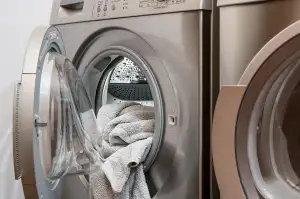Home Remedies: Effective Techniques to Catch and Eliminate Fruit Flies

- Understanding the behavior and breeding habits of fruit flies
- Identifying the areas where fruit flies are commonly found in homes
- Simple DIY traps to catch fruit flies using common household items
- Using natural remedies and ingredients to attract and trap fruit flies
- Proper disposal methods for captured fruit flies
- Preventive measures to keep fruit flies from returning to your home
Fruit flies, scientifically known as Drosophila melanogaster, are small insects that can be a major annoyance in our homes. These tiny creatures, measuring only about 1/8 inch in length, are attracted to ripened fruits and vegetables, as well as fermented liquids and organic matter. While they may seem harmless, fruit flies can quickly multiply into large populations if not addressed promptly.
The presence of fruit flies can be quite bothersome as they tend to hover around food preparation areas, garbage cans, and even bathroom drains. Their ability to reproduce rapidly makes them difficult to control once an infestation occurs. Fruit flies lay their eggs on the surface of overripe fruits or vegetables, which then hatch into larvae within a day or two. These larvae feed on the decaying matter before pupating and eventually emerging as adult fruit flies.
Not only do fruit flies contaminate our food with bacteria and other pathogens they carry on their bodies, but they also have a short lifespan of around 30 days. This means that even if you manage to eliminate them once, new generations can quickly take their place. Therefore, it is crucial to understand their behavior and breeding habits in order to effectively eradicate them from our homes.
Understanding the behavior and breeding habits of fruit flies
Understanding the behavior and breeding habits of fruit flies is crucial in effectively eliminating them from your home. Fruit flies are small insects that are attracted to ripe and decaying fruits, vegetables, and other organic matter. They have a short lifespan of about 8-10 days but can reproduce rapidly. Female fruit flies lay their eggs on the surface of fermenting fruits or vegetables, which hatch into larvae within 24-30 hours. These larvae then feed on the fermenting matter for about 4-6 days before pupating into adult fruit flies. This rapid life cycle allows fruit fly populations to grow quickly, making it important to address the issue as soon as possible.
Identifying the areas where fruit flies are commonly found in homes
Fruit flies are commonly found in areas where there is decaying organic matter. In homes, they are often seen near kitchen sinks, garbage disposals, and trash cans. They are also attracted to overripe fruits, vegetables, and fermenting liquids such as wine or beer. Fruit flies can also be found in damp areas like drains, mops, and sponges. It's important to thoroughly clean these areas to eliminate any potential breeding grounds for fruit flies.
Simple DIY traps to catch fruit flies using common household items
One of the most effective ways to catch fruit flies is by creating simple DIY traps using common household items. These traps are easy to make and can help reduce the fruit fly population in your home. One popular trap involves using a small bowl or jar filled with apple cider vinegar. Fruit flies are attracted to the sweet smell of vinegar and will be lured into the trap. To create the trap, cover the bowl or jar with plastic wrap and secure it with a rubber band. Then, poke several small holes in the plastic wrap to allow the fruit flies to enter but make it difficult for them to escape. Another DIY trap option is to use a mixture of dish soap and water in a shallow dish. The soap breaks the surface tension of the water, causing fruit flies to sink and drown when they come into contact with it. Place these traps near areas where you have noticed fruit flies congregating, such as near ripe fruits or garbage cans. Remember to empty and clean these traps regularly to prevent any build-up of dead fruit flies.
Using natural remedies and ingredients to attract and trap fruit flies
Using natural remedies and ingredients to attract and trap fruit flies is an effective and eco-friendly way to control their population in your home. Fruit flies are attracted to sweet, fermented odors, so you can create a homemade trap using apple cider vinegar as bait. Simply pour a small amount of apple cider vinegar into a jar or bowl and cover it tightly with plastic wrap. Poke several small holes in the plastic wrap using a toothpick. The fruit flies will be lured by the scent of the vinegar and will enter through the holes but won't be able to escape. Another natural remedy is creating a mixture of dish soap and water in a shallow dish. The soap breaks the surface tension of the water, causing the fruit flies to sink when they land on it. Place these traps near areas where fruit flies are commonly found, such as near ripe fruits or in the kitchen. Regularly empty and clean these traps to ensure their effectiveness.
Proper disposal methods for captured fruit flies
Proper disposal of captured fruit flies is essential to prevent their re-infestation. Once you have successfully trapped the fruit flies, it is important to dispose of them promptly and effectively. One method is to submerge the trap containing the fruit flies in a solution of soapy water. The soap breaks the surface tension of the water, causing the flies to drown quickly. Another option is to place the trap in a sealed plastic bag and freeze it for a few hours. This will kill the fruit flies without any mess or odor. Remember to clean and sanitize the trap after disposal to prevent any lingering odors or attractants that may attract more fruit flies. By following these proper disposal methods, you can effectively eliminate fruit flies from your home and maintain a pest-free environment.
Preventive measures to keep fruit flies from returning to your home
Preventive measures are crucial to ensure fruit flies do not return to your home. Here are some effective strategies:
1. Cleanliness: Keep your kitchen and other areas free from food debris, spills, and overripe fruits. Regularly clean countertops, sinks, and garbage cans to eliminate potential breeding sites.
2. Proper storage: Store fruits and vegetables in the refrigerator or in sealed containers to prevent them from attracting fruit flies. Dispose of any overripe produce promptly.
3. Trash management: Seal trash bags tightly and dispose of them regularly. Clean trash cans frequently to remove any residue that may attract fruit flies.
4. Drain maintenance: Fruit flies often breed in damp areas like drains. Use drain cleaners regularly to prevent buildup of organic matter that can attract these pests.
5. Screens and seals: Install screens on windows and doors to prevent fruit flies from entering your home. Check for gaps or cracks in walls, windows, and doors, sealing them properly to deny entry points.
6. Vinegar traps: Place small bowls filled with apple cider vinegar near areas where fruit flies congregate. Cover the bowl with plastic wrap and poke small holes in it; the scent will attract the flies, trapping them inside.
7. Essential oils: Fruit flies dislike certain scents like lavender, lemongrass, or eucalyptus oil. Mix a few drops with water in a spray bottle and use it as a natural repellent around potential breeding areas.
By implementing these preventive measures consistently, you can significantly reduce the chances of fruit fly infestations in your home. Stay vigilant and maintain cleanliness to keep these pesky insects at bay!
In conclusion, effectively controlling fruit flies in your home requires a combination of trapping, natural remedies, and preventive measures. By understanding their behavior and breeding habits, you can target areas where they are commonly found. DIY traps using common household items such as vinegar or wine can be highly effective in catching fruit flies. Additionally, using natural ingredients like apple cider vinegar or ripe fruits can attract them to the traps. Proper disposal methods, such as sealing the captured flies in plastic bags before discarding them, are essential to prevent reinfestation. To keep fruit flies from returning, it is crucial to maintain cleanliness and hygiene in your kitchen and other areas where food is stored. Regularly clean countertops, dispose of overripe fruits promptly, and keep trash cans tightly sealed. Lastly, ensure that all potential entry points for fruit flies, such as cracks or gaps in windows or doors, are properly sealed. By implementing these tips and techniques consistently, you can effectively control and eliminate fruit flies from your home.
Published: 26. 02. 2024
Category: Home



